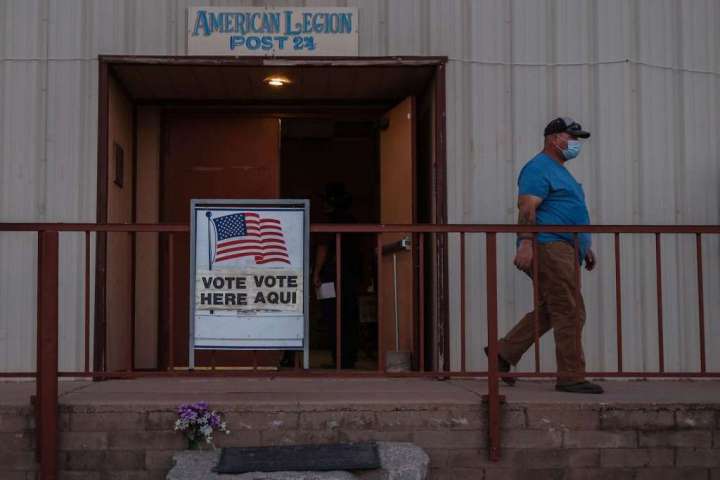PHOENIX — Citing efforts by Arizona’s Republican-controlled legislature to restrict access to voting, a coalition of advocacy organizations, community groups and volunteers is attempting to drastically expand voting rights in the battleground state through a ballot initiative. On Thursday, the coalition gave state elections officials the signatures of more than 475,000 Arizonans who want to see the issue put to a vote in November.
Arizona activists want a vote on expanding access to voting

The “Arizona Fair Elections Act” ballot initiative seeks to enact dozens of provisions to expand access to voting and lessen the possible influence of special interests on state lawmakers.
The prospects of the initiative are unclear. The coalition needed to submit 237,645 signatures from Arizona voters by Thursday. Elections officials with the secretary of state and counties will spend the coming days reviewing petition sheets for compliance and signature verification.
The initiative, among other things, would allow voter registration on Election Day; would ban purging of the Permanent Early Voting List for those who have previously not voted; would allow food and water to be given to people waiting in lines to vote; and would reverse current law to allow early ballots to be turned in by those who are not just family members or caregivers.
The initiative also seeks to ban the legislature from changing rules for presidential electors after Jan. 1 of an election year. It also would prevent the type of months-long review of 2.1 million ballots in Maricopa County that the GOP-led Senate launched after former president Donald Trump, his allies and thousands of voters baselessly complained of widespread fraud after his 2020 loss in the state.
It would also limit the amount of money that lobbyists could spend on special events and travel for legislators at $500.
Arizonans for Fair Elections, a coalition made up of advocates working on behalf of civil rights, environmental justice, education and faith-based groups, unloaded 462 boxes of signatures at the state Capitol, the culmination of 150 days of signature-gathering.
The campaign is funded by local democracy-protection groups, including Activate 48, an Arizona-based coalition that for years has worked at the state level to defeat bills it deems cumbersome for voters. Most of the groups are liberal-leaning.
“This is what democracy looks like,” said Roy Tatem, political director for the group Our Voice Our Vote Arizona, which helped with the initiative.
“It needs to be stated right here because obviously there’s some occupants of this building that don’t know what democracy looks like. Many of them feel that their choice should be our vote. No. The people vote for our choice.”
Tatem and other supporters said the initiative is a direct response to dozens of efforts pursued this year by Republican lawmakers to alter the electoral process.
“We as a people are standing together saying that we won’t stand for it,” he said at a news conference conducted in English and Spanish.
“So here we are, in the middle of the summer — hot, sweaty, ready to work.”
A spokeswoman for the Arizona Republican Party did not immediately respond to a request for comment on the initiative.
Ben Petersen, a spokesman for the Republican National Committee, told The Washington Post that the ballot initiative was unnecessary and could weaken election security.
“If the initiative successfully makes the ballot, voters will reject the Democrats’ radical attempt to take over Arizona elections and change the rules in their favor,” Petersen said in a written statement.
After the 2020 presidential election, Republican lawmakers in nearly every state introduced legislation that they said could prevent fraudulent votes from being cast — but could also make it difficult for millions of Americans to participate in elections.
These proposals include stricter ID requirements, limited hours for voting or early voting, and narrower eligibility to vote absentee. Last year, at least 19 states passed 34 laws that restricted access to voting, according to the nonpartisan Brennan Center for Justice, which tracks voting legislation.
Arizona voters are slated to weigh in on other election-related matters in the Nov. 8 general election that directly compete with provisions of the Arizona Fair Elections Act.
One, for example, would require mail-in ballots to include identification.
Another would require an initiative or referendum that approves a tax to receive 60 percent of the votes cast to become law.
Maria Teresa Mabry, co-executive director of the Arizona Democracy Resource Center, sees the initiative as a way to make sweeping gains in civil participation.
“We have this vast opportunity to really shift the conversation from trying to get folks engaged, where our communities have historically been disenfranchised, to actually creating a space where we can educate our communities, hold the line, and say what we desire and want,” Mabry said.






